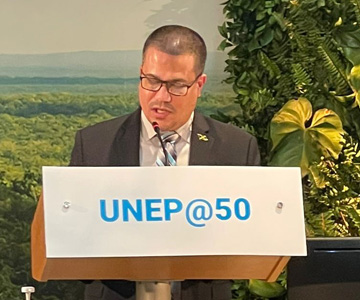
Address to the Special Session of UNEA-5
Excellencies, ladies and gentlemen, thank you for providing me with the opportunity to address the resumed fifth session of the UN Environment Assembly. This session allows us to gain consensus on multilateral environmental efforts on biodiversity, climate, pollution and food systems, among others.
The COVID-19 pandemic has brought unprecedented challenges globally, including the adverse impact on the development of economies, public health and the environment. However, the pandemic, also presents opportunities for us to make the shift from unsustainable production and consumption patterns, to approaches that promote the circular, blue and green economies.
In support of this agenda, the Government of Jamaica on January 1, 2019, commenced the phased implementation of its ban on the importation, distribution, manufacture and use of certain types of single use plastics.
The ban targeted plastic bags of a specific dimension and thickness, plastic drinking straws, as well as straws forming part of the packaging of drink boxes and juice pouches. The ban, which is governed by two Ministerial Orders, also applied to polystyrene foam containers used in the food and beverage industry.
The Government is also actively implementing its Green Business Jamaica Programme to incentivize the public and private sectors to improve their environmental stewardship.
Given the global plastic crisis, the Government of Jamaica supports a proposal through UNEA 5.2 to establish an Intergovernmental Negotiating Committee (INC) on plastics to guide and coordinate the implementation of UNEA resolutions in place since 2014.
The wider Caribbean Region is experiencing the impacts of nutrient pollution including nitrogen-based eutrophication, harmful algal blooms, as well as Sargassum blooms.
These impacts have consequential effects on livelihoods and human health and impair ecosystem services that underpin vulnerable island economies
Jamaica therefore acknowledges the support of the UNEP Caribbean Environment Programme (CEP) Regional Coordination Unit (CAR RCU), Secretariat to the Cartagena Convention, for initiating the development of a Regional Nutrient Pollution Reduction Strategy and Action Plan.
The Strategy and Action Plan aims to provide a framework for increasing collaboration and action to reduce the impacts of nutrient pollution on coastal and marine ecosystems in the region.
Jamaica is also actively engaged in restoration programmes for several key marine and coastal ecosystems, including mangrove forests, seagrass beds and coral reefs. However, international commitments for significant restoration of priority ecosystems is urgently required.
These initiatives must support the targets in the post-2020 Global Biodiversity Framework once agreement has been reached, and opportunities must be identified through the Decade of Ocean Science and the UN Decade on Ecosystem Restoration.
In December 2020, Jamaica and 13 other countries, announced their commitment to a new Global Ocean Action Agenda which seeks to “achieve 100 per cent sustainable ocean management of areas within national jurisdiction guided by sustainable ocean plans by 2025, and to support a global target to protect 30 per cent of the ocean by 2030
Among the country’s international biodiversity and blue economy commitments, is the declaration of a section of the Pedro Bank as a protected area, which is expected to be accomplished this year. The area comprises approximately 882 square kilometers, and contains significant biodiversity. Approximately 18.1 per cent of terrestrial and 13 per cent of marine areas will be under legal protection.
We also remain committed to address the challenge of climate change. Jamaica has increased its ambition in the mitigation component of its Nationally Determined Contribution (NDC) and has taken steps to move towards an economy-wide target that will bring emissions from the land use change and forestry sector within its NDC.
The UNEA 5.2 can play a key role in the process of building consensus on the use of nature-based solutions for adaptation and mitigation.
Jamaica is finalizing Vulnerability and Risk Assessment Plans as well as Climate Change Adaptation Plans for the five priority sectors (coastal resources, health, housing, tourism and water) featuring nature-based solutions and approaches as a key strategy.
We welcome the support of the international community as the country moves to consolidate its efforts to delink economic growth and development from unsustainable practices, while making itself more climate-resilient.
Post COVID-19, it is imperative that Governments, in partnership with local, regional, and international stakeholders, chart a course of action that recognizes Nature at the Heart of Sustainable Development.
Thank you.
Warning: count(): Parameter must be an array or an object that implements Countable in /hermes/walnacweb05/walnacweb05ag/b1611/pow.consulsjamaicacom/mattsamuda/wp-includes/class-wp-comment-query.php on line 405
